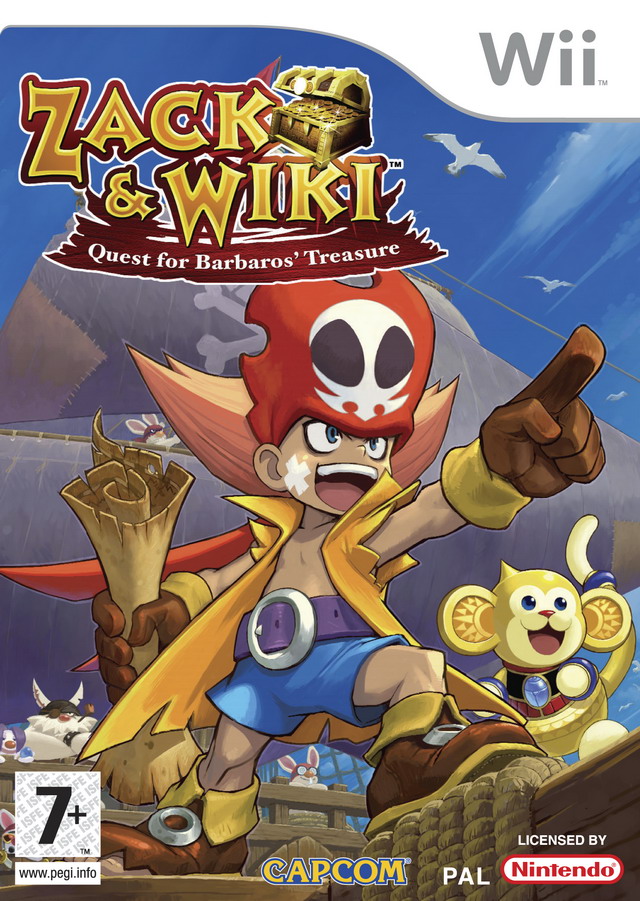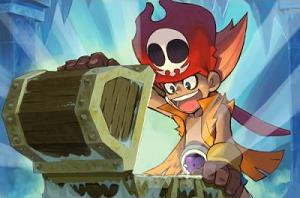Video Game Review: Zack & Wiki: The Quest for Barbaros' Treasure
 |
ZACK & WIKI: THE QUEST FOR BARBAROS' TREASURE
Release Date: 11/23/2007
Platform: Nintendo Wii
Developer: Capcom
Publisher: Capcom
|
 |
ZACK & WIKI: THE QUEST FOR BARBAROS' TREASURE
Release Date: 11/23/2007
Platform: Nintendo Wii
Developer: Capcom
Publisher: Capcom
|
Ever since the caver-turned-programmer Will Crowther created Colossal Cave Adventure in the mid 1970’s, adventure games have been a force of video game innovation. In the early PC age of Infocom, King’s Quest, and The Secret of Monkey Island, adventure games were known by all. However, over thirty years after the first recognized adventure game—in the modern age of hi-definition graphics, advanced A.I. heuristics, adrenaline-pumping shooters, MMORPGs, and gravity-defying platformers—is there still a place for the adventure game?
If Zack & Wiki: the Quest for Barbaros’ Treasure is any indication, the answer is a resounding “Yes!”
Unfortunately, this is a game that doesn’t seem to know what its target audience should be. The first time I looked at the cover for the game, I felt like the characters were familiar, probably from some obscure Japanese kids show that was becoming popular on Adult Swim, and I immediately wrote it off as another Naruto: Clash of Ninja, Pokemon Battle Revolution, or One Piece: Unlimited Adventure (which is definitely not an adventure game). Even after I learned otherwise thanks to IGN.com’s relentless “Buy Zack & Wiki” campaign, when I finally popped the adventure into my Wii for the first time, I felt hoodwinked into buying a cloyingly over-the-top Japanese anime game. The first half-hour or so is chock-full of anime clichés, and any gamer who, like me, finds high-pitched wailing annoying is going to have a rough time getting over that first impression, which is at least seven and a half times more cringe-inducing than the most irritating cutscenes of The Legend of Zelda: The Wind Waker or Super Mario Sunshine.
 | | Goons! |
Of course, I trudged through the first chapter, with all of its crazed cell-shaded madness, and eventually found the meat of the thing, which is a deceptively simple point-and-click adventure game similar to Sam & Max Hit the Road or King’s Quest V. It’s a brilliant match for Nintendo’s new system, because the Wii is the first system to effectively bring a point-and-click interface to a home console. However, due to its obnoxiously kiddie presentation and ridiculously bad title, Zack & Wiki: The Quest for Barbaros’ Treasure is going to be hard-pressed to find the long-lost adventure game junkies, who are now at the very least in their mid-to-late-twenties and getting their fix with more adult-themed games like The Indigo Prophecy. Additionally, at the midpoint of the game, the difficulty curve greatly exceeds the abilities of the casual audience that is most likely to buy Zack & Wiki based on its kid-friendly appearance, so when it fails to find the seasoned adventure gamers, it will ultimately frustrate the younger folks, turning them off to what should be a fantastic experience.
Despite this huge and probably fatal flaw in the game’s design, Zack & Wiki is still a great adventure title that belongs in your library. It manages to take a very old video game mechanic and make it innovative again, thanks to Nintendo’s ingenius system and Capcom’s heavy third-party support of it. Few games outside of Nintendo’s own creations make proper use of the Wii remote, but Zack & Wiki, with nearly pixel-perfect accuracy, makes using the remote fun and intuitive without forcing you to do complicated acrobatics.
And that’s the most important aspect of the game: it’s fun to play. Even though the constant trial-and-error would hopelessly ruin most other games (I guarantee you’ll die more times than you can count), it doesn’t seem to frustrate, because the game makes it simple to try again or get hints, and it encourages you to start the level over so that you can acquire a higher score (measured in HirameQ, which is rewarded based on how quickly or creatively you solve various puzzles).
 | | Treasure! |
There’s a sense of discovery and gratification when you start to solve each puzzle—a recognition of wit rather than reflex—and it seems far more rewarding than blasting generic alien #823 in the latest cookie-cutter FPS. Still, the solutions to some puzzles will have you scratching your head a little too much, and some stages have timed events that are so quick or frequent you barely have time to think, which goes against the general laid-back mood of the rest of the game. These relatively infrequent moments will lend themselves to some hair-tugging and controller slamming, but it’s easy to walk away from the game and come back after you’ve cooled off a bit (or cheated by looking online, if that’s your thing). The lack of any autosaving indicator is troublesome, but I never came back to discover I had to do something over again, and the low frame-rate is disappointing considering that the stylized graphics are some of the best on the console.
In the final analysis, I highly recommend the game. It may be flawed in many ways, but it’s unabashedly fun and addictive. You can play in short spurts, but if you must play all the way through in one or two sittings, you’re likely to enjoy a core game of fifteen to twenty hours, which does not include retreading old ground for better scores or more unlockables. Also, purchasing this game helps support third parties on the Wii, modern adventure games, and of course, innovation. Even if you don’t remember such classic adventures as Zork, you will definitely find something about Zack & Wiki that you can love. Did I mention it only costs $39.99?
FINAL TALLY
STORY: 16/20
GAMEPLAY: 19/20
PRESENTATION: 45/60
BONUS POINTS: 0
TOTAL SCORE: 80/100 |
|
-e. magill 01/28/2008
|
|